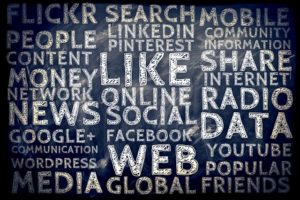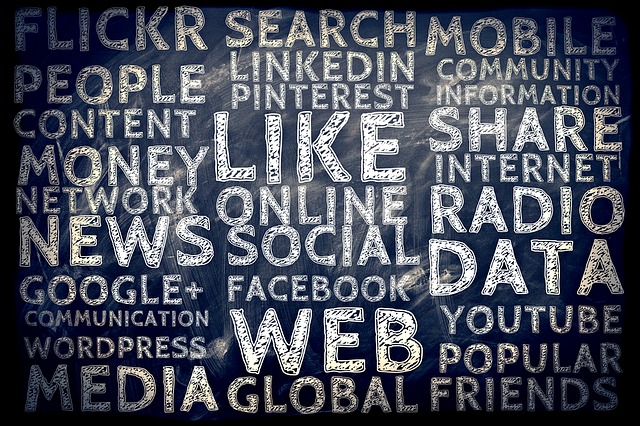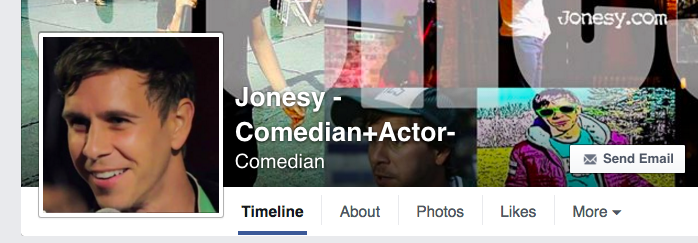I trained as a journalist with the BBC, and then developed my craft with British and American broadcasters. I’ve spent the last decade working as a marketing consultant. So I’m steeped in old media – print, radio, television.

And, if I’m honest with you, I hate social media. I pine for the good old days when marketing yourself successfully as an artist was all about talent and working hard on your craft. I’m sure many of you are nodding along in agreement. And that’s because you’re deluded. Marketing success in the arts has never been merely about talent and hard work. And never will be.
The truth is that the principles of marketing haven’t changed much. What has changed, thanks to social media, is the supremacy of the gatekeepers. The journalists, reviewers, agents and producers – who you had to win over in the past – can now be bypassed to reach and cultivate an audience directly. Creatives are cottoning on to this fact, and most of the comedians I know have established, and are trying to grow, their online presence. Sadly, the vast majority of them are doing so ineffectively.
As someone who specialises in building and protecting the online reputations of both corporate and non-profit clients, I’m well-placed to offer some guidance for my fellow comedians and other creatives on avoiding the most common mistakes.
1. Know your persona
Before we get to the nitty gritty of online marketing and social media strategies, there’s a more fundamental question you need to ask yourself: Who are you?
Or, more pertinently: “Who do you want to be… to the public?”
Who you are to the public is your brand identity.
Are you a cheeky Northerner? A quick-fire gagmeister? A prop-wielding punsmith? An out-of-touch Tory boy? A patronising champagne socialist? An abrasive perma-victim feminist/ethnic who won’t stop whining? Then that’s your brand identity.
“Hey, I’m complex. You can’t just boil me down to a handful of words. I’m so much more than that!!” many of you will protest. Sorry to break it to you, but to journalists, venues, broadcasters and, much more importantly, to the public you are just a one-line description. You are only complex, deep and important to yourself and to your mother. To the rest of the world, you’re almost certainly somewhere between a non-entity and inconsequential.
If you want to become more than that then you need to work out what your identity is all about, and then consistently behave accordingly in all your interactions with the online world. Many of you will be well versed in stage personas. This is about extending that same mindset over to cyberspace.
And stay consistent. Being happy-go-lucky one day but aggressive and miserable the next is not acceptable. You wouldn’t do that in your real life work (e.g. on stage). So don’t do it online. It confuses punters. And confused punters inevitably desert you.
2. Pay for a decent website
You should be paying a reputable company to host a quick-loading website for you. That will also make a huge difference to your Google ranking later down the line. So don’t scrimp here, especially as it costs as little as £100 a year. Your website is your shop window. Free wordpress sites or badly constructed Wix setups, in the eyes of the public, make you look like you have a shoddy product. And by “product” I mean you.
What you don’t necessarily have to pay for is someone to build it for you. If you have even average computer skills, and a little free time, then you can make your own simple functional website in less than a week. (If you absolutely don’t have those skills then you could hire me to do it for you.)
3. Yes, you do need a social media fan page
“But who am I to deserve a fan page? People will laugh at me for having one!”
It’s a common refrain I hear from comedians. Look, there will always be haters, loudly bitching from the sidelines about the people who actually get off their arse and do something with their talents. If you care more about their opinion than you do about your own fulfillment then you can stop reading this now. You are beyond help. This article isn’t for you.
Still reading? OK then. There are many reasons to create fan pages for your brand (i.e. yourself) on Facebook, Twitter, Instagram etc.
Firstly, it says that you take yourself seriously. Having spoken to veterans of the comedy industry – check out my podcast – an oft-repeated regret I hear is “I didn’t take myself seriously enough in the early days.”
Secondly, it’s the quickest, easiest, and most convenient way to have a dialogue with your existing and potential admirers. It also allows them to enjoy your latest output, give you immediate feedback, and share your content with others. Measuring the success of any engagement campaigns also becomes a doddle.
Finally, and vitally, it separates you, the private individual, from your public persona. Your fan pages – on Facebook, Twitter and Instagram etc. – are public. Using a personal Facebook profile to engage with punters is a rookie mistake.
Keep your private life separate from your public persona. If it’s not too late, use a stage name. I know of several performers whose naïve assumptions that their two worlds would never collide have damaged their respectable non-creative careers.
4. Don’t put “Comedian” in your fan page title, FFS!!
Or actor, musician, model, satirist or writer. It looks amateurish and suggests a lack of confidence in yourself. Do you think David Beckham calls his fan page David Beckham – Footballer?? Of course not. And I can guarantee you won’t find an official Madonna the Singer/Songwriter page on Facebook.
We’ve all got that one friend who sticks “Doctor” or “BA Hons” in their Facebook profile name, which reeks of inadequacy. It’s no different for a fan page. Sticking a profession in the title is not just suggestive of limited career aspirations. It also implies you’re not very comfortable in your own skin.
Your name is your brand. It is an asset in and of itself. Treat it with the respect it deserves. Your profession / craft / talent goes in the description of the page.
5. #Learn #To #Use #Hashtags #Properly
The point of hashtags is to drive traffic to your content. That’s the one and only reason to use them. And that will only happen if you use hashtags that lots of people are actively searching for regularly.
Here’s an example of what not to do:
How many people do you think are searching for the hashtags #FeelingBlessed? #HomeTownGig? #ImSoHappy? Almost none is the correct answer. So they’re not helping increase public engagement with you or your work. And since the likes of Twitter and Instagram limit your wordcount/hashtags, you’re wasting valuable real estate on worthless waffle.
6. Play to your strengths
Are you a great joke writer? Then start making your mark on Twitter.
Do you produce hilarious memes? Then get posting on Instagram.
Are you an articulate debater? Then write a regular blog.
Musical comedian? Performance poet? Get on YouTube!
And if, like me, you’ve got a voice for radio then start podcasting!
But you cannot and should not do them all!
It’s better to focus on just one or two social media platforms that you enjoy and play to your strengths. Don’t dilute the quality of your output by spreading yourself too thin.
7. Don’t worry too much about joke theft
Many comedians have felt the sting of having their kudos usurped by various online entities with the words “Lad” “Bible” “Viral” or “George Takei” in the title. (FUCK YOU George Takei!! You no-talent ham. I wish you’d died instead of Nimoy!)
Out in the real world, of office jobs and corporate ladders, the most ignoble and self-serving bastards are always stealing the credit for other people’s work. You can’t expect the arts to somehow be immune.
You can and should take steps to make it harder for amoral swindlers to steal the acclaim that’s rightfully yours. If / when it does happen, I won’t try and assuage your anger with any “just see it as a compliment” bullshit. You’ve been burgled and have every right to be upset. But it’s an essentially unavoidable occupational hazard. A mere drop in an ocean of unpleasantness that permeates the internet. Try not to dwell on it.
8. Find and cultivate the right audience online
Not everyone will find you or your work interesting. Some will actively hate it. If you can’t make peace with that reality, you don’t really belong in the public eye. But if you can appreciate and accept this simple truth, you’re ready to start finding and cultivating the audience that will be most appreciative of you and your art.
Once you have an accurate understanding of your brand identity (see #1 above), you’ll have a better idea about who you’ll appeal to most, so you can start reaching out to them.
If you’re a cheeky Northerner then your low-hanging fruit will be Lee Mack and Peter Kay fans.
Are you a left-wing firebrand on stage? Then start targeting the Jeremy Corbyn and Bernie Sanders supporters.
Angry black man? Luckily for you, there are plenty of politically correct poseurs willing to wallow in white guilt and fake laugh at your obsession with prejudice.
9. Value your fans…
… or, more specifically, make your fans feel like you value them.
This is “Sales 101” stuff really. “But I’m not a salesman, I’m an artist!” many of you will protest. That’s fine. If toiling in obscurity and poverty, but being adored and admired after your death, is the dream then good luck to you.
If you live in the real world, however, then you need to show respect to the public who pay your bills. Respond to private messages. Follow people back on Twitter. Answer questions and comments with charm, patience and good humour.
10. Pay for online advertising… wisely
Yes, you should consider paying for social media advertising. But, since most of you will have limited budgets, you’ll need to ensure you’re using your money effectively.
I’ve seen comedians pay for Facebook adverts telling the world they’ve won some minor award or that they’re performing at some charity show. That’s just massaging your own ego. The public doesn’t care. And industry folk almost certainly already know.
The point of advertising is to reach a demographic that:
a) doesn’t already know you;
b) you can’t reach organically;
c) will put some money back into your pocket.
“Return on investment” is the name of the game.
So, realistically, the only times you should be paying for advertising will be when you are promoting a show that you’re producing yourself, or if you’re selling a product (DVDs, apps, music etc.). And targeting that advertising carefully, to ensure only the most receptive potential punters see it, is exceptionally important.
11. BONUS TIP: Shun the haters
Showbiz is burdened with some of the bitchiest, bile-filled, bitter and entitled underachievers you will ever have the misfortune to meet. And social media is infested with some of the most heinous examples of humanity you will ever come across. Many of them with a seemingly infinite amount of free time to waste spreading their negativity.
These people will prey upon your instinctive politeness to draw you into long debates and diatribes that are of no value to you. These are exactly the people for whom that BLOCK button was invented. Remember: the trolls and haters have no right to your time or energy. Any time you waste even thinking about these people, let alone engaging with them, is time you’re not using engaging with and entertaining the audience that is worth cultivating. So fuck ‘em. BLOCK. BLOCK. And BLOCK again.
Jay is a multi-award-winning comedian, writer and broadcaster. His debut solo show, Travels with Autism, will premiere at the Edinburgh Fringe in August 2016. You can find him on Facebook, Twitter and Instagram.



Be First to Comment